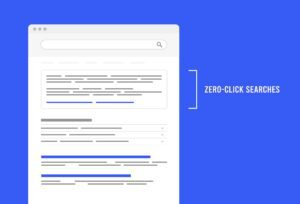Any SEO strategy worth its salt has thousands of different facets informing it, from buyer behaviour to website build, to seasonal demand, too – maybe most importantly – search engine stats.
In this post, we’ll be focusing on those search engine stats and share some of the most interesting facts and figures concerning the search engine landscape today!
As SEO experts, our Organic team are always looking ahead to see what search engines are looking for in order to build visibility and drive traffic for our clients. To learn more about what they’re looking at, keep reading! Or, to see how we can help maximise the online potential of your business, please get in touch with our team at 0161 327 2635, or email us at info@embryo.com.
Spotlight on Google
- Google doesn’t actually share how many searches it processes, but estimates put that number at about 63,000 search queries per second! Scaled up, this is about 5.6 billion searches per day and nearly two trillion searches every year, as of 2021.
- In comparison, when Google first launched in September 1998, it only averaged about 10,000 daily search queries.
- While they keep their methods close to their chest a lot of the time, Google takes into account 200+ factors before determining the right results for a user’s search query.
- 77% of Google users search using Google three or more times per day.
- In 2021, the most popularly searched term on Google was “Google”.
- Today it’s down to 6th place, with “YouTube” being the most searched term in 2023
- In 2021, YouTube made up around 10% of Google’s overall revenue, showing the profitability of not just PPC results in SERPS, but of the Google Display Network as a whole.
- 90.63% of content online actually gets no traffic from Google, according to a 2020 study, showing how important optimising your site really is.
- However, number 1 isn’t everything – the top-ranking page for a search gets the most organic traffic only 49% of the time.
- The average page speed of a first-page Google result is 1.65 seconds (one of those 200+ signals is page speed and loading times for users).
- The average #1 ranking page on Google for any given search term will generally rank in the top 10 for almost a thousand other related keywords.
- Image Search Packs and People Also Ask features appear on almost 20% of Google searches each.
- 79% of keywords are assigned different rankings between mobile and desktop SERPs.
What About the Rest of the Global Search Engine Market?

- Google has the VAST majority of the global search engine market share, at 93.12% at the time of writing.
- Bing is in second place with 2.77%, Yandex at 1.15%, Yahoo at 1.11%, DuckDuckGo at 0.51%, and Baidu at 0.49%.
- When you break it down by device, Google has an even higher share of mobile searches at 96%.
- On the desktop, however, Google has 87% of the share, with Bing’s slice of the pie rising to over 6%. This shows the power of default browsers for a good chunk of users.
- When we take a more granular look though, we can see that in China, Baidu takes up over three-quarters of the search market.
- Baidu’s mobile searches are also increasing and have done so consistently since 2020.
- In Russia, 10. Yandex has captured more than 90% of the total Russian search traffic. The platform supports both Latin and Cyrillic enquiries and is the best search engine when it comes to understanding the linguistic nuances of Russian and other Cyrillic languages.
- More than 27% of Google’s international share of searches comes from the USA, with India coming second with 4.5% of Google’s global searches, and Brazil in third with 4.4%.
How Users Are Searching Online

- 92% of all search queries are long-tailed keywords.
- 14% of Google searches are a question.
- 95% of users only look at the first page of search results when searching on Google
- 25.6% of desktop searches and 17.3% of mobile searches end without a click – that means the majority of searches are successful for users..
- 43.2% of internet users aged 16 to 64 say that ‘researching products and brands‘ is one of their primary reasons for using the internet.
- 75% of users said that paid search engine ads make it easier for them to find the information that they’re looking for.
- 33% of users say they click on those same paid search engine ads because they directly answered their questions.
- Users on Google are four times more likely to click on a paid ad (63% of users) than users on other search functions like Amazon (15%), YouTube (9%), and Bing (6%).
- Google reports that 39% of customers made their final purchase decision choices as the result of a relevant search on the platform.
Searching For a Great Digital Marketing Agency?
Hopefully, this quick run around search engine statistics in 2023 has been helpful and offers some insight into the who, what, and why of organic SEO today. All of this data goes to show the importance of SEO optimisation and that there are so many different considerations involved in creating an SEO strategy, as well as the value of having an expert team on your side for search engine success.
To learn more, take a look at some of our other blog posts and guides, or get in touch with our expert team!















